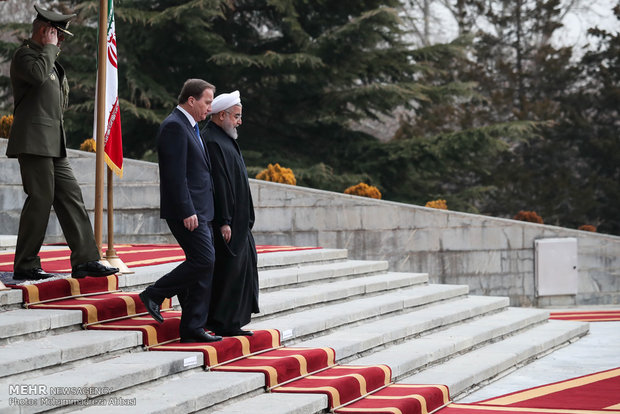Löfven, a Swedish politician who has been the Prime Minister of Sweden since 2014 and the Leader of the Social Democrats since 2012, believes that Iran is a very important actor in the region.
Without doubt the implementation of the Joint Comprehensive Plan of Action (JCPOA) clinched between Iran and the six countries of the P5+1 over Tehran's nuclear program, has led to progress of Iran’s global situation, elimination of Western sanctions and reopening of economic development routes have driven the country’s foreign policy to boost mutual ties - evident in Löfven visit to Tehran for a three-day visit.
The visit was made upon the official invitation of President Hassan Rouhani which has repeatedly put emphasis on reinforcement of ties with all members of the international community within framework of mutual respect, non-intervention in internal affairs, and securing mutual interests.
While in Iran, Löfven attended several meetings and held separate talks with several high-ranking Iranian officials including Leader of the Islamic Revolution Ayatollah Seyyed Ali Khamenei, Parliament Speaker Ali Larijani and President Rouhani.
In the presence of President Rouhani and Löfven, five agreements on cooperation were signed between Iranian and Swedish delegations. Technology, research, roads, communications and women affairs were the issues on which the two signed cooperation agreements.
Back in June 2016, Iran and Sweden had held a joint trade forum with the attendance of Iranian Foreign Minister Mohammad Javad Zarif and Swedish Minister for EU Affairs and Trade Ann Linde.
Man of practice
In a meeting with Löfven, the Leader stressed that the agreements signed between the two countries should not remain on paper.
Referring to the visits to Tehran by European officials over the past one and half years after the signing of Iran nuclear deal which yielded low fruits, the Leader said, “you are a man of practice and action and are expected to act so that the agreements will not merely remain on paper.”
Noting that the intervention of certain big powers is the root cause of today’s problems of the region, the Leader said that well aware of this intervention, the regional nations are pessimistic about the US and many European powers.
Referring to Iran’s positive vote for Sweden’s membership in the UN Security Council, Ayatollah Khamenei said that the Security Council has a major capacity which is unfortunately imprisoned by certain big powers. The Leader, however, noted that Sweden can play a constructive role to prevent the adoption of double standards by this international body.
The Swedish Prime Minister, for his part, pledged to make every effort to put the agreements with Iran into effect.
Löfven said that as a UN Security Council non-permanent member, Sweden has supported the stances of non-aligned countries.
Sweden-Iran ties vital
In a joint press conference attended by Löfven and President Rouhani, the European office noted that maintaining relations with the Islamic Republic of Iran is important to Sweden.
“The visit to Iran by a large delegation of Swedish businessmen and government officials shows the Importance we attach to maintaining ties with the Islamic Republic of Iran,” Löfven said, adding “I am proud to visit the Islamic Republic of Iran.”
Elaborating on his meeting with President Rouhani, the Swedish Prime Minister said that they discussed issues, including regional developments, human rights, the Syrian crisis and ties between Iran and other regional players like Saudi Arabia.
“We also discussed business ties and promoting close relations between Swedish and Iranian companies,” Löfven said.
Sole solution to regional crises
Larijani in a meeting with Löfven underlined that the Syrian crisis does not have a military solution, but national unity is the best way for putting an end to the hostilities in that country.
“The formation of the national unity government is the best method for putting an end to animosities in Yemen and Syria,” Larijani said.
He pointed to long-term wars in Syria and Yemen, and said, “One of the reasons for all these insecurities in the region is that some countries suppose the solution for removal of problems in these countries is military invasion while we believe that the political solution through establishment of democracy and formation of a national unity government is the best method for putting an end to these hostilities.
He, meantime, said that Iran is a country where the highest-ranking official to president and Parliament deputies are elected by people which is one of positive points of our constitution.
“One of the problems of some regional countries is evading democracy and negligence towards its positive role in stability and strength of the countries,” Parliament speaker said.
Scania exports to Iran
Meanwhile, the managing director of Scania said the Swedish truck maker can double its exports to Iran, adding that the company is also willing to help improve road safety in Iran; “we can double our exports to Iran if financing was made easier,” Scania's CEO Henrik Henriksson has told TT News Agency.
"We can contribute with our skills in leadership and education. We want to take part in the effort to improve the environment and road safety in Iran, and hope to receive the support of the Swedish government for this," he added.
Henriksson further said, "it is no secret that it is difficult to do business. Channels must be opened if the market is really to take off.”
Unlike Volvo, Renault, and Daimler, Scania did not halt its operations in Iran when the country was targeted with Western sanctions in 2011.
Although Iran’s trade with Sweden diminished to its lowest level during 2011-2014, consequently, now the two sides are fully determined to reinforce their political and economic cooperation.
For sure, the visits signify an opening of an era of mutual ties between Iran and Sweden that are mulling to expand commercial cooperation through the channel of private sector activists.

























Your Comment